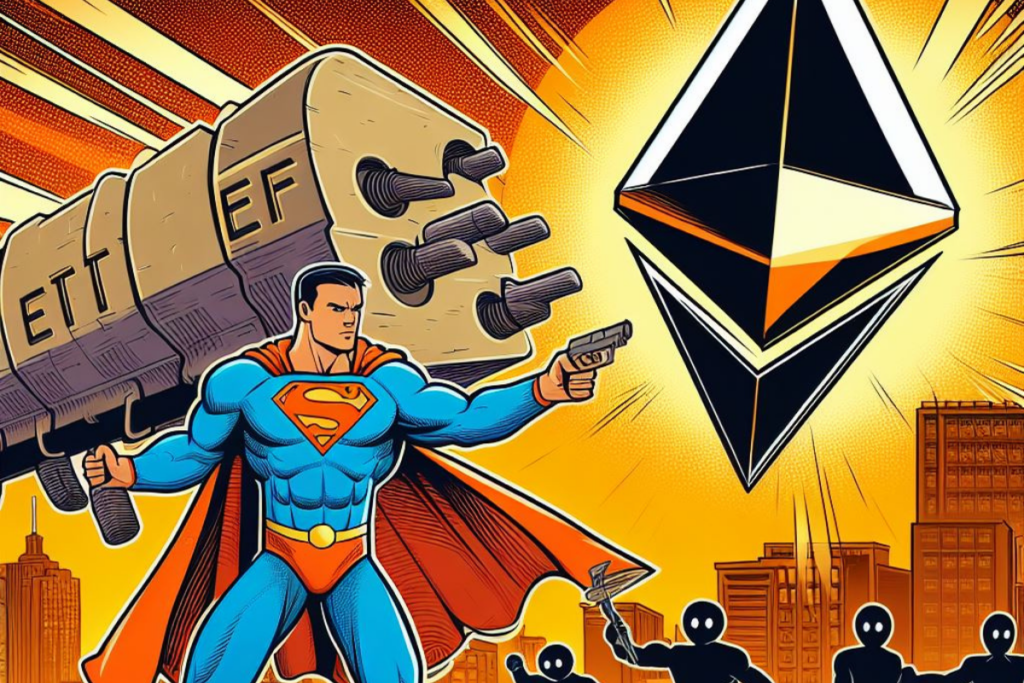Crypto: Ethereum ETFs, the deadly weapon that could annihilate decentralization!
Crypto experts warn that centralization concerns could lead to “serious” security risks following the approval of Ethereum spot ETFs in the United States, especially if staking is integrated.

Risks Related to the Centralization of Ethereum Validators
The issuers of Ethereum ETFs had to remove the clause concerning the staking of clients’ ETH to facilitate the approval process. However, this decision could have long-term consequences on network security.
Since the transition to proof-of-stake in September 2022, validators must lock up their ETH in a process called staking. They receive rewards for securing the network but incur penalties for poor performance.
Centralization issues have already arisen when some validators seized a significant portion of the staked ETH, with some even comparing the liquidity provider Lido to a “cartel.”
Ganesh Swami, CEO of Covalent, explained to Decrypt: “The removal of the staking clause in ETH ETF authorization applications was intended to appease the SEC. But this short-term solution might cause a long-term problem. If multiple ETFs use the same custodians, it would increase concentration, exposing the network to operational risks such as malicious collusion.”
Lack of Regulation and Potential Risks
Spot Bitcoin ETFs in the United States already illustrate the risk of centralization, with Coinbase holding 90% of the total assets. Adding staking could worsen the situation. Andrew O’Neill of S&P Global points out that if ETFs concentrate their participation with a small number of custodians, this could create risks of concentration of crypto validators.
Coinbase, the second-largest Ether validator, is expected to be the custodian for six of the nine companies planning to launch an Ethereum ETF. If the enthusiasm is similar to that of Bitcoin ETFs, this concentration of power could threaten network security.
Mona El Isa of Avantgarde Finance explains: “One can measure the concentration risk by the number of nodes a single entity would need to control the chain. The lower this number, the higher the single point of failure.”
The SEC views staking as a securities service, which explains its removal from Ethereum ETF applications. However, authorities have not established any guidelines to mitigate the risks of centralization and concentration without staking. The SEC has already sued Kraken and Coinbase to prevent them from offering staking services to U.S. clients.
Crypto experts are therefore calling for heightened vigilance regarding Ethereum ETFs to avoid major security risks. It is crucial for regulators and industry players to collaborate in developing clear guidelines aimed at reducing these potential risks and ensuring the long-term security of the Ethereum network.
Maximize your Cointribune experience with our "Read to Earn" program! For every article you read, earn points and access exclusive rewards. Sign up now and start earning benefits.
Passionné par le Bitcoin, j'aime explorer les méandres de la blockchain et des cryptos et je partage mes découvertes avec la communauté. Mon rêve est de vivre dans un monde où la vie privée et la liberté financière sont garanties pour tous, et je crois fermement que Bitcoin est l'outil qui peut rendre cela possible.
The views, thoughts, and opinions expressed in this article belong solely to the author, and should not be taken as investment advice. Do your own research before taking any investment decisions.